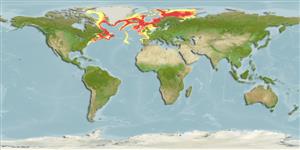Preferred temperature (Ref.
115969): 0.4 - 7.9, mean 3.4 (based on 1760 cells).
Phylogenetic diversity index (Ref.
82804): PD
50 = 0.7500 [Uniqueness, from 0.5 = low to 2.0 = high].
Bayesian length-weight: a=0.00550 (0.00398 - 0.00759), b=3.17 (3.08 - 3.26), in cm Total Length, based on LWR estimates for this species (Ref.
93245).
ระดับชั้นอาหาร (Ref.
69278): 4.0 ±0.5 se; based on diet studies.
ความสามารถในการกลับคืนสู่ปกติ (Ref.
120179): ต่ำมาก, เวลาต่ำสุดที่จะทำให้ประชากรเพิ่มขึ้นเป็น 2 เท่าใช้เวลามากกว่า 14 ปี (tmax=30; tm=10; K=0.02-0.2; Fec=1,300,000; also Musick et al. 2000 (Ref.
36717)).
Prior r = 0.27, 95% CL = 0.18 - 0.40, Based on 1 full stock assessment.
Fishing Vulnerability (Ref.
59153): Very high vulnerability (88 of 100).
Climate Vulnerability (Ref.
125649): Moderate vulnerability (43 of 100).
